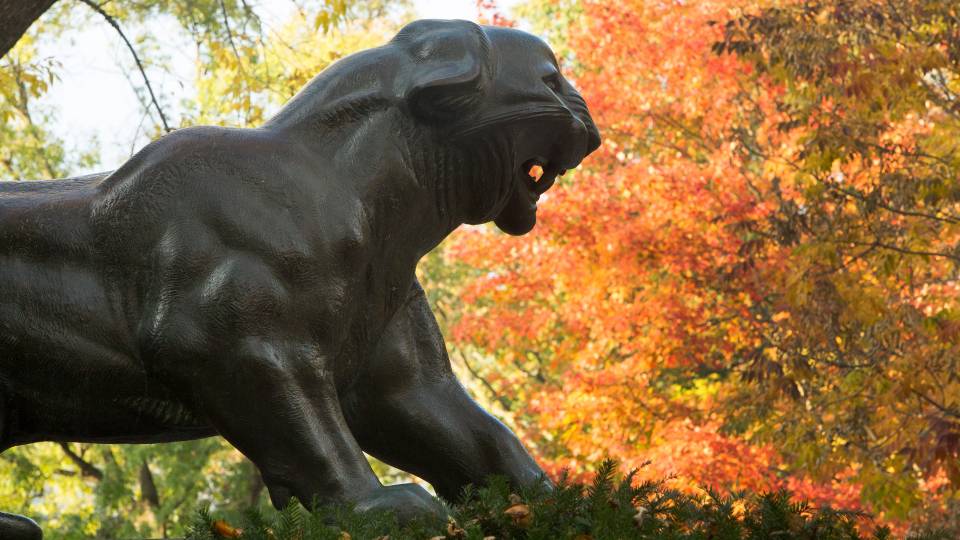Nassau Hall
In a message to the University community, President Eisgruber writes that the pandemic’s impact prevents a genuinely meaningful on-campus experience for undergraduates
Dear Princetonians,
With deep regret and sadness, I write to update you about our plans for the fall, and, in particular, to explain why Princeton has decided that its undergraduate program must be fully remote in the coming semester. In brief, the pandemic’s impact in New Jersey has led us to conclude that we cannot provide a genuinely meaningful on-campus experience for our undergraduate students this fall in a manner that is respectful of public health concerns and consistent with state regulations and guidance.
When I last communicated with you, just over a month ago, we anticipated welcoming undergraduates from the Classes of 2022 and 2024 to campus in late August. We noted at the time, however, that we would continue to monitor the course of the pandemic, and that we might have to change our plans if it worsened. In the weeks that followed, infection rates soared around much of the country, with nearly 2 million new cases reported over the last month. This development had two serious adverse consequences for Princeton’s ability to provide undergraduates with a positive and safe on-campus experience in the fall.
First, the health risks to the campus and surrounding populations appear greater now than they did just a month ago. Reopening efforts in New Jersey and elsewhere have demonstrated how difficult it is to contain the disease. Where schools and universities have started to bring back students, COVID cases have rapidly followed.
People throughout this University have done outstanding work to prepare the campus to receive students safely, but the risk of widespread contagion and serious illness remains. Moreover, even if we successfully controlled on-campus spread of the disease, transmission rates might rise statewide or in our region. We might then have to send undergraduate students home again or impose exceptionally severe restrictions on their mobility and interaction with one another.
Second, the persistent spread of COVID-19 compelled New Jersey to preserve and augment restrictions that it expected to ease. New Jersey, like most states, has instituted a phased approach to managing public activities during the pandemic. In early July, New Jersey had reached stage 2 of its reopening plan, and officials were optimistic that we could soon move to stage 3. The state, however, had to pause its plan to avoid the spikes of infection that occurred in other states as they reopened.
Instead of loosening regulations, New Jersey justifiably imposed some new ones. For example, over the past month New Jersey has roughly tripled (from 12 to 34) the number of states whose residents must quarantine for 14 days after arriving in New Jersey. We believe that Governor Philip Murphy and his administration have skillfully and responsibly managed the extraordinary challenges of COVID-19 and the risks it poses to New Jersey, and we appreciate their attention both to the pandemic and to the complex needs of the higher education sector.
New Jersey’s careful approach has helped to keep the pandemic in check, but public health principles and state guidance still limit very substantially what we can do on campus. For example, they prevent or severely constrain our ability to provide several key elements of residential life, including indoor dining, student gatherings, and access to indoor common spaces and gyms. Colleges and universities have not yet received general authorization to teach in-person classes. Moreover, many out-of-state students now face strict quarantine requirements upon their arrival in New Jersey.
This combination of health concerns and restrictions will significantly diminish the educational value of the on‑campus experience. It will also render that experience confining and unpleasant for most students.
In light of the diminished benefits and increased risks currently associated with residential education amid New Jersey’s battle against the pandemic, we have decided that our undergraduate program should be fully remote in the fall semester of 2020. We will continue to accommodate on campus those students whose situations make it extremely difficult or impossible for them to return to or study from home. We will also accommodate a very limited number of students with previously approved exceptions recognizing their need to be on campus for specific aspects of their senior thesis research or other work essential to their degree programs.
We continue to hope that we will be able to welcome undergraduate students back to campus in the spring. If we are able to do so, our highest priority will be to bring back seniors in the Class of 2021. We hope we will also be able to bring back additional students. We cannot, however, make any guarantees. We will communicate with you about the spring semester in the weeks and months ahead. Please know that we are doing everything we can to make possible a residential semester in the spring.
In the meantime, we remain committed to offering the best possible undergraduate education consistent with the difficult conditions imposed by the COVID pandemic. Princeton’s faculty and staff across campus have been working for months to develop new and engaging online offerings, knowing that much of our program would have to be virtual even if some of our students were on campus. Though we wish we could restore a residential component to our teaching program, we will now focus even more intensely on making the virtual academic and co-curricular programs as strong as they can be.
Because of their different instructional and residential programs, it will still be possible for Princeton’s graduate students, including incoming first-year graduate students, to be on campus for the upcoming semester. Most programs are also able to offer remote options for incoming first-year graduate students for the fall term as needed. The Graduate School will continue to provide information about this topic.
We appreciate that you undoubtedly have many questions not answered by this letter. We have updated our FAQs for all students, parents, and other members of the community, and we will continue to do so in the days ahead.
I understand, as do my colleagues, that the news contained in this letter will be disheartening and disappointing. We know that our students very much wanted to be back on this campus. We very much wanted to have you here: you are the life of this place, and we miss you tremendously.
We will continue to do everything we can to welcome students back as soon as possible to a campus experience that is both safe and meaningful. We look forward to that day, and until then we will work together with all of you to sustain this special community in the face of the unprecedented challenges we’re confronting together.
With very best wishes,
Christopher L. Eisgruber























